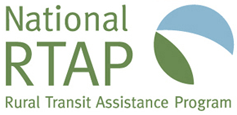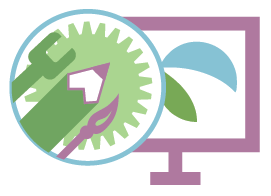Website Accessibility Training
RESOURCES > TECHNOLOGY TOOLS
Quick Links: Accessibility Requirements | Guidelines | Tools and Guidance | Training Videos
Introduction
Transit agencies interact with and serve the public on a daily basis. A significant portion of the public has disabilities, and technology has allowed for new ways of communicating with those individuals.
Major studies find that about 20% of people using the Internet have some form of disability. There are 4 major categories of disabilities: Visual, Hearing, Motor Skills, and Cognitive. The Internet is a useful tool for persons with disabilities, but only if the websites and web content are accessible.
It is important that individuals with disabilities can access the information posted on your transit website, including schedules, routes, fares, service updates, agency policies, passenger information, and how to file a complaint.
Some of the reasons why you should work towards making your transit agency website accessible include:
- To improve the lives of persons with disabilities by enabling them to access the information and resources on your website, and thus better utilize your transit services,
- To reach a wider audience, leading to more awareness of your system within your community and thus increased ridership,
- And to comply with regulations that apply to transit agencies receiving federal funding, including the American’s with Disabilities Act (or ADA), Section 504 of the Rehabilitation Act of 1973, and any relevant state or local laws.
Web Accessibility Requirements
In terms of website accessibility requirements, Federal Transit Administration (FTA) Section 5311 sub-recipients are covered by the Americans with Disabilities Act (ADA) as well as Section 504 of the 1973 Rehabilitation Act. FTA addresses website accessibility in Section 2.8 of the ADA Circular, available at https://www.transit.dot.gov/sites/fta.dot.gov/files/docs/Final_FTA_ADA_Circular_C_4710.1.pdf.
The applicable section (Section 2.8) of the ADA states the following, though please see the Circular for a full discussion on this requirement:
“The entity shall make available to individuals with disabilities adequate information concerning transportation services. This obligation includes making adequate communications capacity available, through accessible formats and technology, to enable users to obtain information and schedule service (§ 37.167(f)).”
Per the U.S. Department of Health and Human Services website, here is a breakdown of Section 504 regulations:
"Section 504 requires agencies to provide individuals with disabilities an equal opportunity to participate in their programs and benefit from their services, including the provision of information to employees and members of the public. Agencies must provide appropriate auxiliary aids where necessary to ensure an equal opportunity. Types of auxiliary aids may include brailled or large print versions of materials, electronic diskettes, audiotapes, qualified interpreters or readers, telecommunications devices for deaf persons (TDDs), captioning of video, and other methods of making information available and accessible to persons with disabilities. In considering what type of auxiliary aid to provide, agencies must give primary consideration to the request of the individual with a disability and shall honor that request, unless it can demonstrate that another effective means of communication exists."
There are no U.S. Department of Transportation (DOT)-issued enforceable standards for websites and other information technology. As a best practice, it is recommended that transit agencies follow the basic elements of WCAG guidelines for web content and make it clear that they will provide alternative formats upon request.
For more information about the requirements, see the links and resources below.
- Americans with Disabilities Act webpage - Federal Transit Administration website: https://www.transit.dot.gov/ADA
- What is Section 504 and how does it relate to Section 508? - U.S. Department of Health and Human Services website: https://www.hhs.gov/web/section-508/what-is-section-504/index.html
- Do Section 508 Accessibility Standards Apply to My Website? - U.S. General Services Administration Section 508 website: https://www.section508.gov/blog/do-section-508-accessibility-standards-apply-to-mywebsite/
- Rider Information and Accessible Formats - National RTAP ADA Toolkit: http://nationalrtap.org/adatoolkit/Rider-Information
Web Content Accessibility Guidelines
For those interested in the WCAG Guidelines and Section 508 standards for website accessibility, see the links below.
- Web Content Accessibility Guidelines (WCAG) Overview - W3C Web Accessibility Initiative website: https://www.w3.org/WAI/intro/wcag
- Section 508 Checklist - WebAIM (Web Accessibility in Mind) website: https://webaim.org/standards/508/checklist
Tools and Guidance for Creating Accessible Websites and Documents
Here are some of the tools and guidance that can be used for checking the website accessibility of your website, fixing any accessibility errors, and making accessible documents.
- Adobe Acrobat instructions to make your PDF documents accessible: https://helpx.adobe.com/acrobat/using/create-verify-pdf-accessibility.html
- ColorZilla Color Contrast Checker: http://www.colorzilla.com/
- Microsoft Word instructions to make your Word documents accessible: https://support.office.com/en-us/article/Make-your-Word-documents-accessible-d9bf3683-87ac-47ea-b91a-78dcacb3c66d#PickTab=Windows
- PAC 3 PDF Checker: https://www.access-for-all.ch/en/pdf-lab/pdf-accessibility-checker-pac/downloading-pac.html
- Paciello Group Colour Contrast Analyser: https://developer.paciellogroup.com/resources/contrastanalyser/
- WebAIM (Web Accessibility in Mind) Website: https://webaim.org/
- WebAIM Color Contrast Checker Website: https://webaim.org/resources/contrastchecker/
- US Department of Justice (DOJ) Guidance on Web Accessibility: https://www.ada.gov/resources/web-guidance/
- US General Services Administration (GSA) IT Accessibility, Section 508: https://www.section508.gov/training/
If you would like to hear what it is like for persons with disabilities to access websites, we’ve included demonstration videos of screen readers reading inaccessible and accessible websites:
- Accessible vs. Inaccessible - Can you Hear the Difference? https://www.youtube.com/watch?v=5TNU_t-9w1A
- National Clearinghouse of Rehabilitation Training Materials Section 508 CoP: Screen Reader Simulation https://www.youtube.com/watch?v=C1HSIW9FCqU
Website Accessibility for Transit Agencies Video Series
In this video series we are going to help you look at designing your website with accessibility in mind. We will focus on websites that use National RTAP’s Website Builder tool and hosting service, but the information can apply to other website platforms.
- Checking your website for accessible color contrast
- Fixing color contrast failures
- Applying accessible colors to content headings
- Check the accessibility of Adobe Acrobat Portable Document Format (PDF) documents
- Fix PDF accessibility failures using the Adobe Acrobat PDF Editor
- Create accessible titles, figure alt tags, reading order and color contrast in PDF documents
- Add alt text to images, buttons and links
- Create accessible text and URL links
Additional Support
If you have a question or need assistance on a rural or tribal transit topic, contact us at 888-589-6821, info@nationalrtap.org, or start a live chat. We welcome comments and suggestions on National RTAP products as well.
For individual staff email addresses and phone numbers, see the Staff page.
Contact Us
We will get back to you as soon as possible.
Please try again later.

National RTAP offers one-stop shopping for rural and tribal transit technical assistance products and services. Call, email, or chat with us and if we can’t help with your request, we’ll connect you with someone who can!
" National RTAP offers one-stop shopping for rural and tribal transit technical assistance products and services. Call, email, or chat with us and if we can’t help with your request, we’ll connect you with someone who can! "
Robin Phillips, Executive Director
" You go above and beyond and I wanted to let you know that I appreciate it so much and always enjoy my time with you. The presentations give me so much to bring back to my agency and my subrecipients. "
Amy Rast, Public Transit Coordinator Vermont Agency of Transportation (VTrans)
" I always used the CASE (Copy And Steal Everything) method to develop training materials until I discovered RTAP. They give it to you for free. Use it! "
John Filippone, former National RTAP Review Board Chair
" National RTAP provides an essential service to rural and small transit agencies. The products are provided at no cost and help agencies maximize their resources and ensure that their employees are trained in all aspects of passenger service. "
Dan Harrigan, Former National RTAP Review Board Chair
" We were able to deploy online trip planning for Glasgow Transit in less than
90 days using GTFS Builder. Trip planning information displays in a riders'
native language, which supports gencies in travel training and meeting Title VI
mandates. "
Tyler Graham, Regional Transportation Planner Barren River Area Development District
Slide title
" Having a tool like GTFS Builder is really light years ahead of what it used to be at one time in terms of how fast you can put everything together. Our university students really can't imagine transit without it, so I think it's very important for us in terms of attracting that particular demographic. "
Michael Lachman, Transportation Services Manager HAPCAP - Athens Transit
Slide title
" In the past we used proprietary database software that was very challenging, very murky, and hard to update. GTFS Builder is a great opportunity to make this more user-friendly, more readily updatable and it
would enable us to show how to create a GTFS to more of the staff. "
Jaime McKay, Former Manager of Direct Services Center for Mobility Equity
Slide title
" Collaboration is a buzz word these days in the industry. On behalf of our Tribal segment, I appreciate RTAP for making Tribes a partner in industry opportunities. The organization goes over and beyond reaching partners one would not expect in a busy industry such as public transportation. Thank you for your tireless efforts! "
Franklin Akoneto, Comanche Nation
Slide title
"We are so very thankful for all your transportation training materials. Your resources are as valuable as gold!"
Holly Walton, Transportation Assistant Manager, Curative Connections
A program of the Federal Transit Administration administered by the Neponset Valley TMA
National RTAP is committed to making this website accessible to persons with disabilities. If you need assistance accessing any content on our website or need alternative formats for our materials, please contact us at info@nationalrtap.org or 781-404-5020.
by National RTAP |


